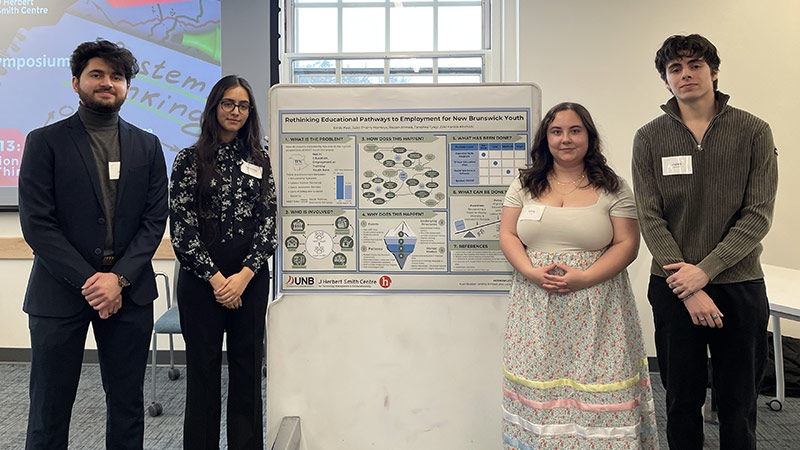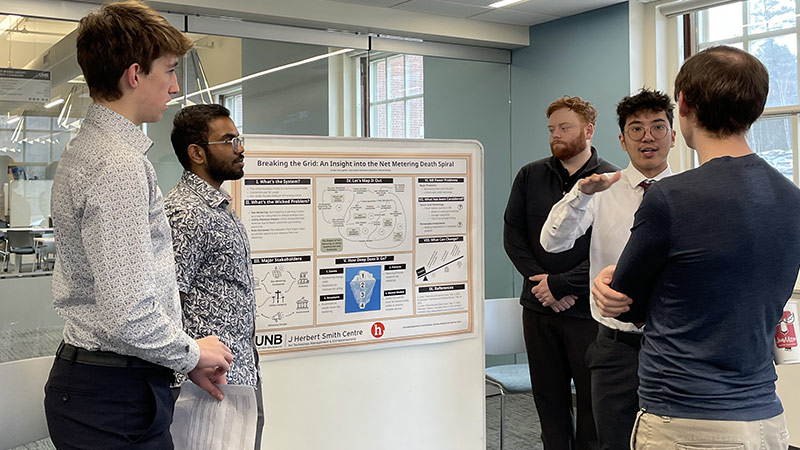Students reflect on systems thinking course and tackling wicked problems
Author: UNB Engineering
Posted on Jun 19, 2025
Category: News & Events , Student Spotlight , Department Updates

In a course that brings together students from across disciplines, University of New Brunswick students spent the semester tackling real-world challenges, often referred to as “wicked problems”, using systems thinking tools and methods in their Technology Management and Entrepreneurship course.
Emily Paul, a fourth-year Bachelor of Arts student on a pre-law path, says the course, and her work presenting “Rethinking Educational Pathways to Employment for New Brunswick Youth” at the TME Poster Symposium, reshaped how she approaches complex issues. “I am now able to approach problem-solving through a recognition of all that goes into its creation,” she said. “The methods we use in this class, which involve taking a complex system and working on its smallest intricacies through the creation of maps and diagrams, have been integral to my ability to problem-solve.”
Emily admitted that finding potential solutions to their challenge was more difficult than expected. “I remember my team spent hours one night on a call with our wonderful Teaching Assistant just trying to come up with tangible solutions to our problem, and this was a week before the course ended!” she said," “Dr. Bubbar is not joking when he says we are working with wicked problems.”
The course emphasizes interdisciplinary collaboration, something each student found valuable. “I was also the only Canadian-born student in my group, and our project is specifically focused on the education systems in our province,” said Emily. “I believe our project is as strong as it is due to the variety of backgrounds and experiences that went into it.”
Liam Apold also pointed out that they “had a very diverse group of different disciplines, including commerce, computer science, and two different engineering disciplines. There were many varying opinions which opened up new avenues of discussion and allowed some of us in engineering to look at things from a business point of view.”
Liam also noted that conducting interviews with experts was key. “Finding credible sources was a challenge, so having many interviews with people who had much expertise in their field was very important,” he said.

For computer science student Tanishka Tyagi, the course helped shift her mindset around problem-solving. She worked alongside Emily in their “Rethinking Educational Pathways to Employment for New Brunswick Youth” presentation. “This course and the systems thinking way started off by halting problem solving but focused on understanding the problem,” she said. “This made a major difference in my approach because I learned the importance of dissecting the problem first.”
She also highlighted how the interdisciplinary makeup of the teams strengthened their analysis. “We were able to focus on eliminating much bias from our analysis,” she said, noting how her team drew perspectives from Arts, Business, Engineering, and Computer Science.
All three students agree that the course left a lasting impact.
“I now recognize that issues are composed of a variety of stakeholders, and there is nobody who is inherently 'good' or 'evil',” said Emily. “The systems thinking approach has helped shape me in a way that I am open to listening to opinions that differ from mine.”
Tanishka summed up the experience simply: “This course enabled me to work on what I consider to be the best project of my degree.”
